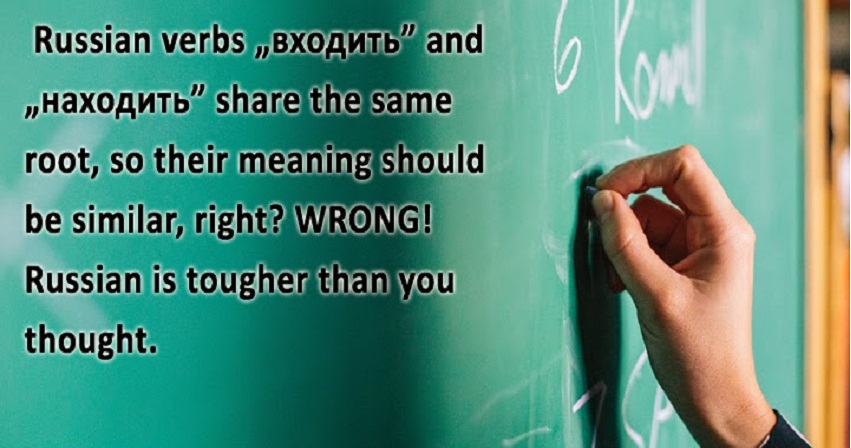Starting to learn Russian can be as difficult as trying to swim against the current: no matter how hard you try, it seems that there is always another rule of grammar, pronunciation or lexical curve that is directed towards you.
Fortunately, we have prepared a list of traps in which you can fall with great probability. So the next time your classmates make these mistakes, you will be that annoying and presumptuous student who smiles behind the backs of others.
Eight common mistakes made by all who learn Russian
Confuse “dévochka”, “dévushka” and “dédushka” (девочка, девушка и дедушка)
Many foreigners are surprised to discover that in Russia they should go to a waitress or a saleswoman like dévushka, which means “young”, to get their attention. Unfortunately, this word is dangerously similar to dévochka, the word you would say to a little girl: this phonetic oversight could be perceived as an attempt to humiliate her and could cause hot water to fall on her (or at least you could be left waiting for your plate a long time …)
However, the total disaster would be that you accidentally told her dédushka, so you would not only confuse her age, but you would also take her for an old man. Be very careful around there. Read more http://madblogz.com/transformers-over-time-a-brief-history/
Accentuation: the downfall of all students
Getting used to accentuating Russian words correctly takes a long time. Sometimes you will face a new word and you will have no idea how to pronounce it. Read more: 5 tricks to buy Russian fashion clothes without having to sell a kidney
“The most frustrating thing is when I accentuate an easy word badly,” says Chris Patchman, an English student at the MGIMO (State University of International Relations in Moscow). “I tried to reserve a table in the restaurant once and repeated the word адрес (adres or” address “) in Russian for about ten minutes, trying to figure out where that place was. But it turns out that he said it as ‘adrEs’ and not ‘ Adres’, and the woman had no idea what he was saying. ”
In this case, being misunderstood, in reality, is not a drama. If you say “я плачу” (“ya place”) in a restaurant, for example, and you accentuate the vowel “a”, you will not be saying that you want to pay, but you will declare your intention to cry. Read more: 10 Russian fashion designers to whom you can buy clothes on the internet
And may God help you if you confuse the accent on the word “писать” (“pisat”): if you emphasize it on the “a”, it means “to write”, but if you put the accent on the “i”, it means “peeing” ” Boys and girls, context matters.
“I really like it”
Believe it or not, but the Russian equivalent of this phrase (“я очень люблю”, “ya ochen liubliu”) is completely correct. The problem starts when you try to do a direct translation. For example, the Russian equivalent of “I like it a lot” would be “я люблю очень много” (“ya liubliu Jochen mnogo”), and it is something that does not make any sense. However, you will get used sooner or later. Who knows, maybe one day you will be telling a Russian partner with a great command of the language that you “love him a lot”. How sweet.
Vocalize too much the “o” sound that is not accepted
It is likely that the words хорошо (“joroshó” – good, good) and молоко (“molokó” – milk) are among the first Russian words you learn, but unfortunately, you are likely to pronounce them wrong. It is normal that you are tempted to pronounce all the vowels “o” in the same way, but the unstressed “o” is usually pronounced as a long “a” in the Russian language. Keeping in mind that the accent in молоко and хорошо falls into the final “o”, they are pronounced like this: “malakó” and “jarashó”.
However, in some Russian regions they say all the “o’s” in the same way, so if you’re lucky and you’re wrong, maybe people will think you’re from the provinces. Although I would not place much hope in it.
Do not master the verbs of movement
“During my third learn Russian class, I asked my teacher: ‘How do you say go?'” Recalls Chris Patchman. “She replied ‘ you’re not ready for that yet. ‘ ”
To say in Russian “I went” or “I’ll go” you can use completely different verbs depending on the type of transport you use if you go directly there or you have to turn around if you go and return or just make a trip out. There are also a large number of prefixes that can be added to specify things, such as around (об-), in (в-), to indicate the output the prefix вы- is used, or if you want to say that you are going to enter and to stop inside за- is used. But there are many more …
Learning all these verbal forms is extremely important if you do not want the Russians to put a face of vinegar while you talk to them. If you use an incorrect verb, in their eyes you might be saying something like: “I went to Australia on foot”.
Do not take the “illa” seriously enough
“Whoever was the inventor of this sound was a devil,” says Eleanor Wilson, a former US student at the Polytechnic University of St. Petersburg. “It’s like the sound you make when you take a light hit in the stomach.”
Unfortunately, this letter has its own unique sound, although it may be tempting to surrender and pronounce it as an “i”. Do it but at your own risk, since there is the difference between a mouse (мышка, “myshka”) and a bear (мишка, “Mishka”), and there are more serious cases: being (быть, “by”) and hitting (бить, “bit”).
Inadequate intonation
This happens to all foreigners in Russia: someone says something that sounds like an affirmation and after a few seconds of an awkward silence, he adds “by the way, it’s a question”.
Getting used to the Russian intonation may take a while, but there are ways to adapt. If it is a short question, simply putting the right tone you can distinguish a question from a statement, for example: “Это ресторан” (This is a restaurant) and “Это ресторан?” (Is this a restaurant?). Practice raising your eyebrows a little, this can give you an extra and exaggerated touch of intrigue.
“I made a trip to St. Petersburg, and I asked a man: ‘ Eto Hermitage? ‘ (Is that the Hermitage?), “Says Scott Jones, a former Welsh student at Moscow State University. “He turned around, looked at him and replied: ‘Ya znayu’ (I know).”
If it is a longer question, feel free to bury the upward intonation somewhere in the middle of the sentence, and end the question in the same tone in which you have started it. It seems strange, but perfection is achieved by practicing.
“I like my father, he is very handsome”
For those who speak other European languages, it is too tempting to assume that the word симпатичный (“simpatico”) is the Russian equivalent of “sympathetic” in Spanish. Try to prove it, but it might seem like a Freudian slip: the word симпатичный actually means “handsome”.
Conclusion
As Tolstoy rightly says, there are many reasons to learn Russian, but, it seems easier said than done, right? Of course, like other foreign languages, Russian requires rigor, motivation, and discipline to acquire a certain level. Surely you are asking yourself, why should I learn Russian? Well, there are several reasons why this language is increasingly important. It is the 5th most spoken language in the world in native and non-native speakers, and the 8th in native speakers, and is also more spoken than other popular languages in the world such as French, German or Japanese. In addition, it is an official language of most international organizations and in Spain, there are specific offers for those who speak the language.
Tags: learn Russian, learn Russian common mistakes, learn Russian language, learn Russian tips













Leave a Reply